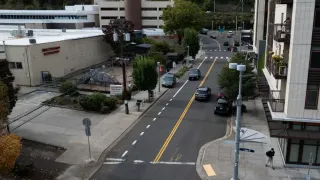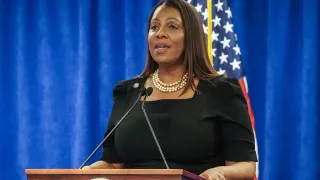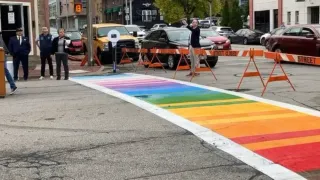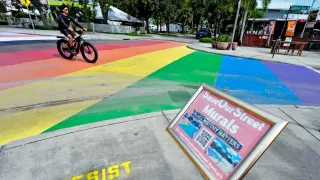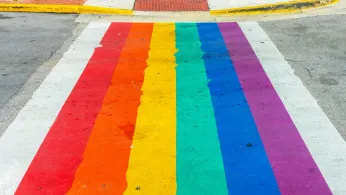
Aug 20
Florida Threatens to Remove Rainbow Crosswalks as Cities Stand Firm Against State Orders
READ TIME: 3 MIN.
On August 19, 2025, the Florida Department of Transportation (FDOT) issued a directive to several cities across South Florida, including Key West and Delray Beach, demanding the removal of their rainbow-painted crosswalks by September 3, 2025. The crosswalks, long-standing symbols of LGBTQ+ pride and inclusion, have become flashpoints in a statewide debate on public art, traffic safety, and queer visibility.
The FDOT’s letters state that these designs violate traffic control device standards outlined in Florida law, and warn cities that failure to comply will result in the state removing the crosswalks “by any appropriate method necessary without further notice.” The letters further threaten that “any additional violations by the City...shall be cause for the immediate withholding of state funds”.
Key West and Delray Beach officials have publicly resisted the order, arguing that the rainbow crosswalks serve not only as expressions of pride but also as safety improvements. Key West Mayor Danise “Dee Dee” Henriquez has stated the city intends to challenge the state’s mandate and hopes to set a precedent for other Florida municipalities with LGBTQ+ street art, saying, “I feel like we could be the example, and that's why we're fighting so hard”.
Fort Lauderdale Mayor Dean Trantalis highlighted the practical benefits of colorful crosswalks, noting that “if we brighten up a certain intersection, it would bring people's attention that they're entering an intersection,” arguing for their role in public safety as well as visibility. Fort Lauderdale, while not yet directly targeted, anticipates a state inquiry and is preparing for a possible confrontation with FDOT.
Wilton Manors and Miami Beach have rainbow designs adjacent to roadways, and as of August 19, neither city has received formal removal orders. Delray Beach city commissioners are scheduled to meet and discuss their response to the mandate, reflecting the widespread uncertainty and concern among local governments.
The FDOT’s crackdown on rainbow crosswalks is the latest development in a series of legislative and administrative actions that have targeted LGBTQ+ expression in Florida’s public spaces. Activists and community members say the removal of pride symbols sends a chilling message and undermines years of work towards greater visibility and inclusion.
Key West’s crosswalks, installed in 2020 as part of efforts to commemorate the city’s vibrant LGBTQ+ history, have become both a tourist attraction and a local landmark. Their threatened removal has sparked concern among residents and advocates nationwide that similar actions could follow elsewhere, including in cities like Orlando, home to the Pulse-inspired crosswalks.
The financial penalties outlined by FDOT—including charging cities for removal costs and withholding state funds—escalate the stakes for local governments, many of which have limited budgets and rely on state support for public works. LGBTQ+ legal organizations are monitoring the situation closely, citing potential First Amendment issues and the right of cities to self-govern when it comes to non-discriminatory public art.
As the September 3 deadline approaches, all eyes are on Key West and Delray Beach as test cases for the future of LGBTQ+ visibility in Florida. Mayor Henriquez has called for solidarity from other cities and allies, emphasizing the importance of “standing up for what’s right, even when it’s difficult.”
Advocacy groups urge the LGBTQ+ community and allies to remain vigilant, participate in city hearings, and support local efforts to preserve pride symbols in public spaces. The outcome of these confrontations may shape not only Florida’s policy but also the broader national conversation about queer inclusion, municipal autonomy, and the ongoing struggle for LGBTQ+ rights in the United States.
